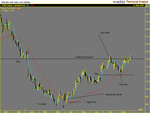Some thoughts on Gaps:
A price gap occurs when the market opens sharply higher or lower and therefore misses out a section of price, which appears on the bar chart as an open space. Clearly they occur most frequently in markets which have been closed overnight. It is a period of high volatility.
There are three main types of gap:
The Breakaway Gap
This gap signals the beginning of a new trend, normally within the completion of a major reversal pattern. The gap is usually created on heavy volume and is not immediately filled.
Runaway or Measuring Gaps
This is where the market is in an established a trend and gaps up again in the direction of trend. It can be partially filled, but that is unusual. It has predictive value in the sense that it usually appears at the 50% level in the up or down trend.
The Exhaustion Gap
Appears near the end of the trend and is nearly always filled. It denotes a market that is exhausted as the price quickly falls back against the prior trend and into the gap.
Price Gaps Example
A classic set of gap plays occurred in the run up of the nasdaq:
The Island Reversal
The Island reversal occurs at the top or bottom of a market. The first part of the formation is an exhaustion gap followed by a period of sideways price action. The market then gaps in the opposite direction of the previous trend (downside breakaway gap). The chart pattern appears detached from all the other price action.
Please note:
1. Gap trading is an artform in its own right, there are not too many traders who manage to make money out of it because:
a. most consider that all gaps must be filled - this is completely incorrect and liable to cost money.
b. most do not consider the 'bigger picture' when looking at gaps and as such do not take a view on what type of gap they are likely to be facing.
2. The easiest way of treating gaps is as a band of support or resistance, nothing more or less. In doing so it gives you specific levels from which you can formulate your trade plan.
3. The most reliable gap pattern is the island reversal.
4. You will rarely see gaps on cash indices as they inevitably open at the previous days close - you will only see the true gap in the futures markets.
HTH
TBS




